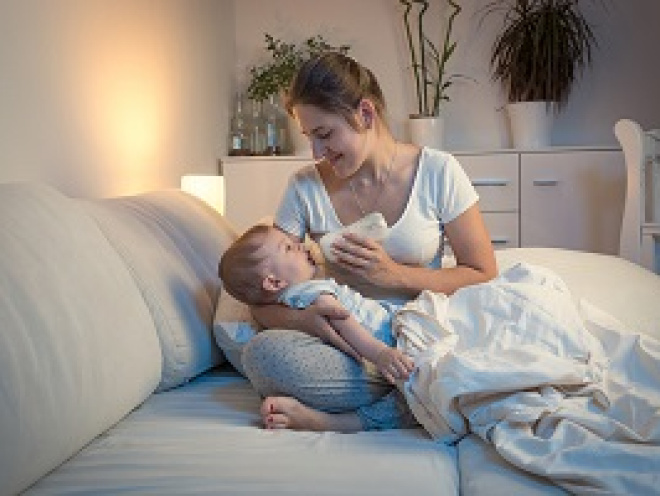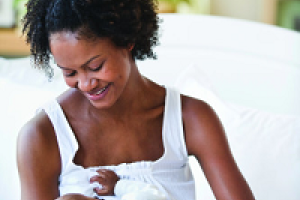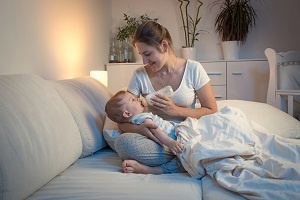Does coronavirus affect formula feeding? Read on to find out more…
Here we provide information and support about formula feeding during the pandemic…
Do I need to be extra careful with my baby’s formula feeding equipment?
Experts recommend being particularly careful with sterilising your baby’s feeding equipment if you might have or do have coronavirus (RCOG, 2020). That means sterilising bottles, teats, bottle brushes and any other bottle-feeding equipment very carefully each time after you use them. It also means storing and handling sterilised equipment in the most hygienic way possible.
For more information, see our article How to sterilise baby bottles, breast pumps and other feeding equipment.
If I think I might have coronavirus, how should I bottle-feed my baby?
As the virus seems to spread through airborne droplets, it makes sense to follow the same recommendations whether you are exclusively breastfeeding, using formula, or a combination of both (RCOG, 2020). Here are the recommendations:
- Make sure you wash your hands thoroughly before you touch your baby or their feeding equipment.
- Try not to sneeze or cough on your baby.
- Think about wearing a mask while you’re feeding your baby.
(RCOG, 2020)
What if I’m combination or mixed feeding?
If you’re using a combination of breastmilk and formula milk, it might be helpful to maximise the amount of breastmilk your baby receives. That’s because there’s lots of evidence that every drop reduces the risk of infectious diseases (WHO, 2009; Riskin et al, 2012; Unicef, 2020).
Our friendly and knowledgeable breastfeeding counsellors can support you with increasing your milk supply, if that’s what you would like to do.
Further information
We support all parents, however you feed your baby. You can call our feeding support line on 0300 330 0700 (option 1) to talk to a breastfeeding counsellor about your questions or concerns, whether you’re breastfeeding, using formula milk or introducing solids. They have had extensive training, will listen without judging or criticising, and will offer relevant information and suggestions. The line is open everyday from 8am to midnight, including bank holidays.
Interactive, engaging and social, our antenatal course is a great way for you to meet other local parents, and get essential unbiased information and knowledge about pregnancy, birth and early days with your baby.
Read the the NHS advice on what you should do when you’re self isolating Take a look at the latest public health guidance for pregnant women and parents.
Click on the following links for guidance on self-isolation and social distancing in Arabic, Bengali, Cantonese, French, Gujarati, Mandarin, Polish, Portuguese, Punjabi, Urdu and Welsh.
For more information about coronavirus in various languages see here.
RCOG. (2020) Coronavirus infection and pregnancy. Available at: https://www.rcog.org.uk/en/guidelines-research-services/guidelines/coronavirus-pregnancy/covid-19-virus-infection-and-pregnancy/ (accessed 18th March 2020)
Unicef; First Steps Nutrition. (2019) Responsive bottle feeding. Available at: https://www.unicef.org.uk/babyfriendly/wp-content/uploads/sites/2/2019/04/Infant-formula-and-responsive-bottle-feeding.pdf (accessed 18th March 2020)
Unicef (2020) Baby Friendly Initiative statement on infant feeding during the Covid-19 outbreak. Available at: https://www.unicef.org.uk/babyfriendly/wp-content/uploads/sites/2/2020/03/Infant-feeding-during-the-Covid-19-outbreak.pdf (accessed 18th March 2020)
First Steps Nutrition. (2018) A simple guide to infant milks. Available at: https://static1.squarespace.com/static/59f75004f09ca48694070f3b/t/5b325b5d2b6a28fb4e3d1233/1530026845937/Infant-milks_a_simple_guide_May2018a.pdf (accessed 18th March 2020)
First Steps Nutrition. (2020) Infant milks in the UK, a guide for health professionals. Available at: https://static1.squarespace.com/static/59f75004f09ca48694070f3b/t/5e3c57479875fd7261b6f4fe/1581012818249/Infant_Milks_January2020_finalb.pdf (accessed 18th March 2020)
Riskin A, Almog M, Peri R, Halasz K, Srugo I, Kessel A. (2012) Changes in immunomodulatory constituents of human milk in response to active infection in the nursing infant. Pediatr Res. 71(2):220-225. Available from: https://www.ncbi.nlm.nih.gov/pubmed/22258136 (Accessed 19th March 2020)
WHO. (2009) Infant and Young Child Feeding: Model Chapter for Textbooks for Medical Students and Allied Health Professionals. Geneva: World Health Organization; 2009. SESSION 2, The physiological basis of breastfeeding. Available from: https://www.ncbi.nlm.nih.gov/books/NBK148970/ (accessed 19th March 2020)







